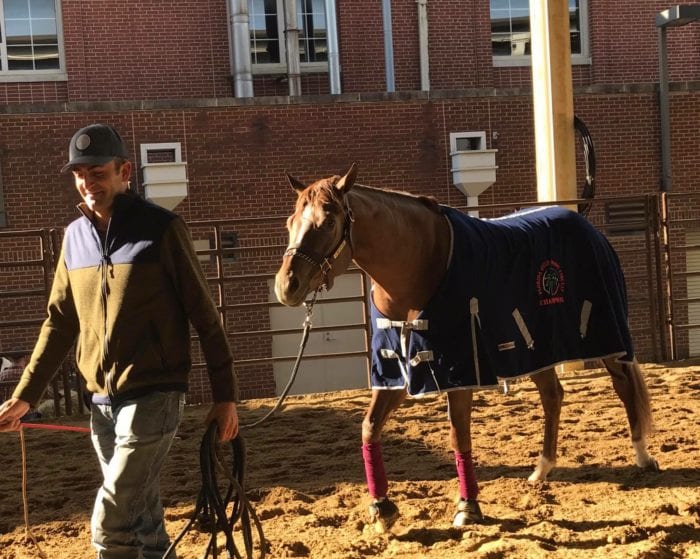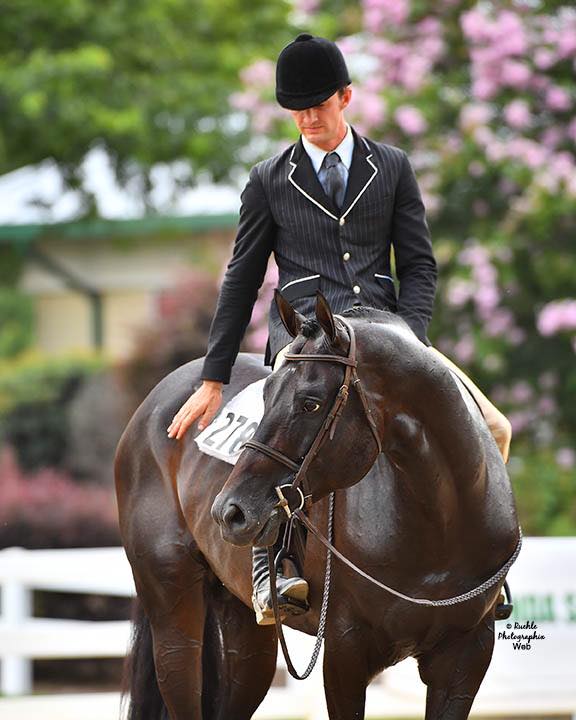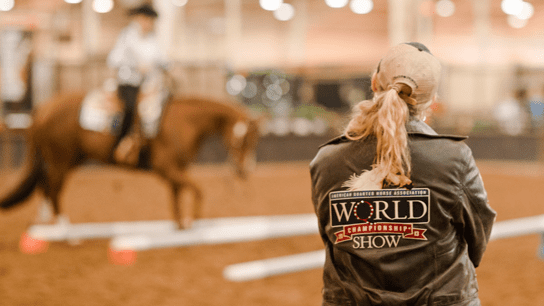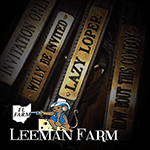Mealtimes are…irregular. Practice happens at all odd hours of the day or night. The barns can be bright, noisy and overstimulating. For most horses, the scene at the World Show is the polar opposite of their healthy home environment.
And yet, all good horsemen know that horses need a daily routine to stay at their best. While the AQHA World Show can be fun, it’s not all play and no work, especially when it comes to keeping your equine partners at their peak.
Your horse needs regular mealtimes, a comfortable, clean stall, turnout and exercise, and also time away from the sometimes overstimulating sights and sounds of the show.
We spoke to three trainers and broke down their take on the challenges and the tips to overcome them to keep their horses at their best in the midst of the World Show environment.
The Challenges
World Show Challenge #1: Keeping a Schedule
 According to Jason and Jamie English, one of the most challenging aspects of the World Show is keeping to a regular schedule. Jamie says, “The most challenging part of the World Show, or any big horse show, is to try to keep your horse on the most normal routine as possible. This means feeding them at their normal feeding hours as you would at home and keeping them on any supplements or stomach regiments to keep them feeling as comfortable as possible.”
According to Jason and Jamie English, one of the most challenging aspects of the World Show is keeping to a regular schedule. Jamie says, “The most challenging part of the World Show, or any big horse show, is to try to keep your horse on the most normal routine as possible. This means feeding them at their normal feeding hours as you would at home and keeping them on any supplements or stomach regiments to keep them feeling as comfortable as possible.”
World Show Challenge #2: Overcomplicating Things
Trainer Julian Harris offers, “We tend to want to overdo things at a big show. Just do what you always do. I don’t longe Miles [AQHA stallion, The Mile High Club] typically, so if I tried to do that at the show, he’d have something to say about it. Just keep it simple and do what you normally do to prepare your horses.”
World Show Challenge #3: Time Management
Trainer Justin Wheeler explains, “The most challenging part about the World Show environment is finding the right time and space to practice. Every horse needs a different kind of warm up and you have to make sure you have excellent time management. The arenas can be crowded and the longing schedule can get hectic, so making sure that we pay attention to all of those aspects helps us get our horses the best preparation possible.”
Strategies for Success
World Show Strategy #1: It’s Just Another Day
 Jamie English advise, “Don’t put your horses in more of a stressful situation than they need to be. Try to treat it the same as every day as much as you can.”
Jamie English advise, “Don’t put your horses in more of a stressful situation than they need to be. Try to treat it the same as every day as much as you can.”
This echoes Harris’ perspective that exhibitors and trainers might feel the need to do more – more longing, more practice, more messing with your horse, but this can add to a horse’s stress. Your horse relies on your signals and the routine you provide to understand its environment.
Justin Wheeler concurs, “We try not to change a lot about our daily routine, especially at the World Show. We feel strongly that the more difficult work should be done at home, so the horse show is more comfortable for our horses. We want our horses to be happy and relaxed so they can adequately perform in the big arena.”
World Show Strategy #2: Don’t Do Your Training At the Show
 Julian Harris intones, “Don’t do all your training at the show. Come to the horse show knowing your horse’s weak points and have a plan for how you want to show. Also, pay attention to others. If you pay attention, you can learn as much about what not to do as what to do. You don’t always have to make your own mistakes to learn from them.”
Julian Harris intones, “Don’t do all your training at the show. Come to the horse show knowing your horse’s weak points and have a plan for how you want to show. Also, pay attention to others. If you pay attention, you can learn as much about what not to do as what to do. You don’t always have to make your own mistakes to learn from them.”
Justin Wheeler agrees, “Of course, you have to do some practicing at the show to keep the horses and riders at their best.” Wheeler’s approach is still to avoid over-preparing. He outlines their strategy, “We practice parts of our patterns in shorter segments to keep our horses’ minds fresher and more focused. We do a lot of riding in the evening when it’s quiet in the show arena, so we can get our horses settled for their classes ahead. Our amateurs have a similar routine. If they need to work on something a second or third time to feel better about themselves, we make sure to do short segments and not to over-prepare.”
World Show Strategy #3: Take Care of Your Horse’s Physical Needs
 Wheeler points out, “Our training routine leading up to the World Show isn’t much different than for any other show, to be honest. We travel a lot with our horses year round, and they are used to being in this kind of environment. We try to make sure they all feel like it’s ‘another day at the office’ while at any show we attend.”
Wheeler points out, “Our training routine leading up to the World Show isn’t much different than for any other show, to be honest. We travel a lot with our horses year round, and they are used to being in this kind of environment. We try to make sure they all feel like it’s ‘another day at the office’ while at any show we attend.”
Justin continues, “One important thing that we do is to make sure the horses are shod perfectly and that they get any chiropractic or veterinary care necessary before we make the long trip to Oklahoma City from California. We also make sure to always keep our horses on ulcer prevention while traveling long distances and throughout the long World Show schedule.
He adds, “We also try to get here a day or two before our classes begin so we can make sure we get the horses in all the different arenas to take it all in. Getting the opportunity to compete at the World Show is the hard work and we try to have fun and enjoy the ride once we get here. It’s the best thing you can do.”
About the Author – A native Michigander, Rachel Kooiker is a lover of horses who loves to write. She competes in all-around Amateur events with her APHA gelding, Hoos Real. She graduated from Grand Valley State University with a BA in English and Psychology and an MA in Curriculum & Instruction. She and her husband Drew operate Kooiker Show Horses, where they stand APHA World Champion Im the Secret.








